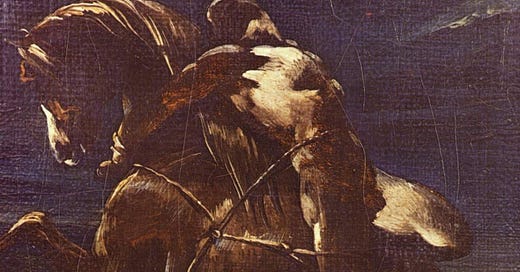Russia is a country with a recidivist history of Realism and Chiliasm. Just what is its futurology? How do we live with it?
In our own lifetimes we are now witnessing a Fifth Battle of Kharkiv, or Kharkov, following the four of WWII. Each time, domination of the area between the Dneipr and Don Rivers has been the ultimate goal.
A parallelogram. Whoever controls an area of this shape stretching between Ukraine and Russia - corners in Poltava, Kyiv, Kursk in Russia and Kharkiv back in Ukraine - controls the European and Middle Eastern side of the Great Game for Eurasia's ‘Heartland’. This was demonstrated by Field Marshal Erich von Manstein in his war memoirs (edited by the great British strategist Liddell Hart), as the former reviewed his campaigns over Summer-Autumn 1943 to retain control of this crucial region.
The two handbooks on my desk for the Russo-Ukrainan War of 2022 are Lord Byron's Mazeppa, and Manstein's Verlorene Siege (1964) (‘Lost Victories’ in English). Byron's Mazeppa is about the Ukrainian leader or Cossack hetman Ivan Mazepa, who allied with the Swedish king Karl XII to fight Peter the Great. Peter defeated them at the Battle of Poltava in 1709. That decisive victory ended all Western bridgeheads and ramps onto Russia. The Bears wrapped their caves in bubblewrap. And Poltava subjugated Ukraine.
The current entrapment on the Ukrainian steppes makes one feel like Mazeppa in Byron's poem. After the Battle of Poltava, Byron imagines Mazeppa confiding to Karl XII a scandal of his youth - he had enraged an ageing Polish count with a young wife. His punishment was to be bound naked onto a horse set loose upon the steppes, exposed to the weather, the sun, carrion birds, thirst and hunger.
And what now? The Russian Army is confined to long convoys because of mud, and grain. The mud prevents tank manoeuvres of the kind both Manstein and the Red Army were famous for at Kursk. The winter grain gets harvested late May early June. It is promised to China. Under Zelensky a portion of land the size of Belgium has been sold to the Chinese, with captive labour, settlements and all.
Zelensky is scoring victories on the iPhone, but who will remember them when Ukraine is Xinjiangised against Insurgency? Who among millennials recognises the name of earlier media resistance star Lech Wałęsa of the Gdansk shipyards? Can Liz Truss or David Lammy point to where Poltava is on a map? The West has failed to deter through a spate of unprepossessing leaders. So much has been taken from politicians through post-political governance, that their sovereignty and statecraft muscles have become flabby. They have become flightless birds.
This post is sent as an addition to the normal routine of subscriber posts, from Bernard Cadogan’s Poetry and Polis substack newsletter. Following his Oxford DPhil Bernard Cadogan has developed, in the past 5 years, a firm track record in International Relations, having been a Treasury and Prime Minister’s foreign affairs advisor.
It is hoped that you will consider subscribing to this post, either for the very reasonable sum of $55-(New Zealand dollars) per year, or having the benefit of Client-level response, at $250-(NZ) per year. Both subscribing options, and associated benefits, are displayed below.
For exisiting subscribers, it is asked you share or forward this message, for those interested in the content.



